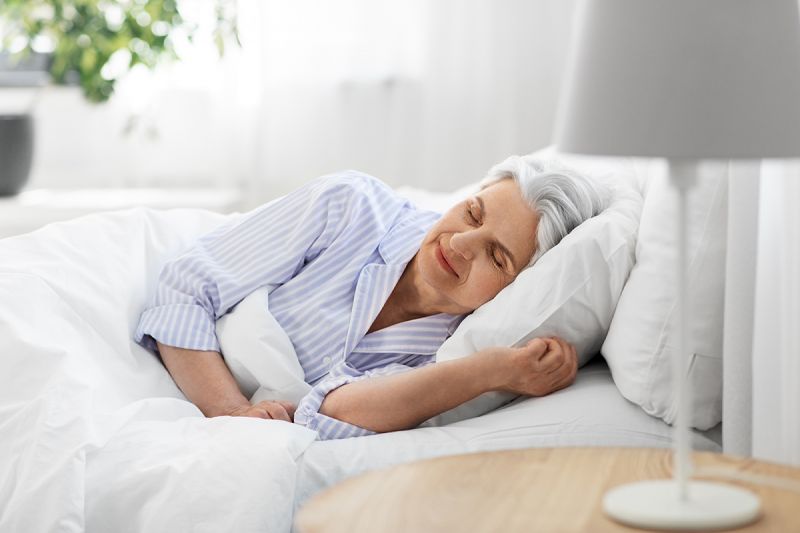10 Things You Can Do to Sleep Better as an Older Adult

As we age, getting a good night’s sleep can become more challenging. However, quality sleep is crucial for maintaining physical and mental health, boosting energy levels, and improving overall well-being.
Here are ten tips to help older adults sleep better:
- Maintain a Consistent Sleep Schedule
Going to bed and waking up at the same time every day, even on weekends, helps regulate your body’s internal clock. This consistency makes it easier to fall asleep and wake up feeling refreshed. - Create a Relaxing Bedtime Routine
Engage in calming activities before bed, such as reading, taking a warm bath, or practicing relaxation exercises like deep breathing or meditation. This routine signals to your body that it’s time to wind down. - Limit Exposure to Screens Before Bed
The blue light emitted by phones, tablets, and computers can interfere with your ability to fall asleep. Try to avoid screens at least an hour before bedtime to help your brain produce melatonin, the hormone that promotes sleep. - Optimize Your Sleep Environment
Make your bedroom conducive to sleep by keeping it cool, dark, and quiet. Invest in comfortable bedding and consider using earplugs, an eye mask, or a white noise machine to minimize disturbances. - Be Mindful of What You Eat and Drink
Avoid large meals, caffeine, and alcohol close to bedtime. Heavy or spicy foods can cause discomfort, while caffeine and alcohol can disrupt sleep patterns. Instead, opt for a light snack if you’re hungry before bed. - Stay Physically Active
Regular physical activity can help you fall asleep faster and enjoy deeper sleep. Aim for at least 30 minutes of moderate exercise most days, but try to finish exercising at least a few hours before bedtime. - Manage Stress and Anxiety
Stress and anxiety can keep your mind active, making it difficult to fall asleep. Practice stress-reduction techniques such as yoga, meditation, or journaling to clear your mind before bed. - Limit Naps During the Day
While napping can be beneficial, especially if you’re sleep-deprived, long or irregular naps during the day can negatively affect your nighttime sleep. If you need to nap, try to keep it under 30 minutes and avoid doing so late in the afternoon. - Evaluate Your Medications
Some medications can interfere with sleep. If you suspect your prescriptions might be affecting your sleep, consult with your healthcare provider. They may be able to adjust your dosage or suggest an alternative treatment. - Consult a Sleep Specialist
If you continue to have trouble sleeping despite making these changes, it may be time to consult a sleep specialist. Conditions like sleep apnea or restless legs syndrome are common in older adults and can significantly impact sleep quality. A specialist can diagnose these issues and provide treatment options.
Good sleep is essential for aging well. By making simple adjustments to your daily routine and sleep environment, you can improve the quality of your sleep and, in turn, enhance your overall health and well-being. Prioritize your sleep just as you would any other aspect of your health, and don't hesitate to seek professional help if needed.
Here are some sleep clinics in Minnesota and Wisconsin that can help with various sleep disorders:
Minnesota
- Mayo Clinic - Rochester, MN
Mayo Clinic offers comprehensive care for sleep disorders, including insomnia, sleep apnea, restless legs syndrome, and narcolepsy. The clinic has a team of specialists who provide personalized treatment plans and advanced diagnostic services. - Allina Health - Abbott Northwestern Hospital
Located in Minneapolis, this center offers a variety of sleep studies and treatments, including for conditions like sleep apnea and restless leg syndrome.
Wisconsin
- Wisconsin Sleep Clinic - Madison, WI
Part of the UW Health system, this clinic provides diagnosis and treatment for a wide range of sleep disorders in both adults and children. They offer the latest technology and therapies. - Ascension Wisconsin Sleep Centers
Ascension has multiple locations across Wisconsin, including Milwaukee and Wauwatosa. They provide diagnostic sleep studies and personalized treatment options, including CPAP and BiPAP therapies. - Mayo Clinic Health System - Multiple Locations in Wisconsin
Mayo Clinic Health System has facilities in Eau Claire, La Crosse, and other cities in Wisconsin, offering similar comprehensive sleep disorder treatments as their Minnesota counterparts.
